Best Collibra Alternatives for 2026: 9 Reasons Why Future-Forward Enterprises Prefer Atlan
Why is Atlan the biggest Collibra competitor in 2026?
Permalink to “Why is Atlan the biggest Collibra competitor in 2026?”Atlan is the best Collibra competitor as modern enterprises with more than $10T in enterprise value in IT, financial services, CPG, retail, and more choose Atlan to future-proof their data and AI estates.
“Atlan continues to innovate with AI-driven metadata enrichment, lineage automation, and an expanding partner ecosystem.” - Gartner Magic Quadrant for Metadata Management Solutions 2025
Atlan has been recognized as:
- Leader in Gartner MQ for Metadata Management Solutions, 2025
- Leader in Forrester Wave™: Data Governance Solutions, Q3 2025
- Leader in the Forrester Wave™ Enterprise Data Catalogs, Q3 2024
- Snowflake Partner of the Year (2025) - Data Governance
On G2, Atlan has 4.5/5.0 peer review ratings, with users noticing several advantages over Collibra, as illustrated below.
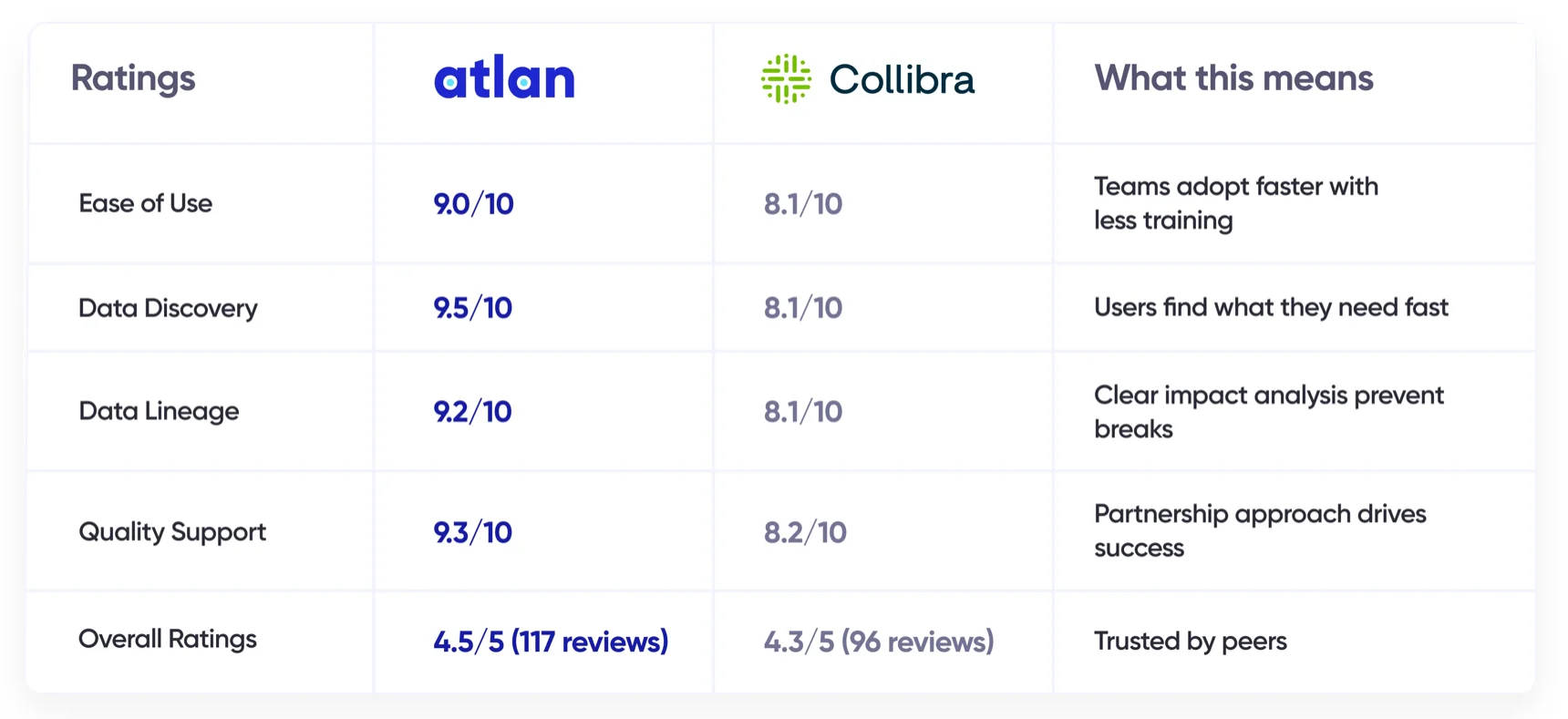
G2 data on how Atlan offers faster time-to-value and drives broader adoption. Image by Atlan.
9 reasons why Atlan is the best Collibra alternative
Permalink to “9 reasons why Atlan is the best Collibra alternative”Now, let’s look at the top reasons for future-forward enterprises to choose Atlan, instead of a legacy solution like Collibra.
1. Adoption-first design with personalized browsing experience driving broad adoption (90%+ active usage)
Permalink to “1. Adoption-first design with personalized browsing experience driving broad adoption (90%+ active usage)”Data teams are diverse, and the same applies to their tools, use cases, and data assets. Your data catalog and governance platform must be equipped to handle the diversity and granularity of modern data and metadata.
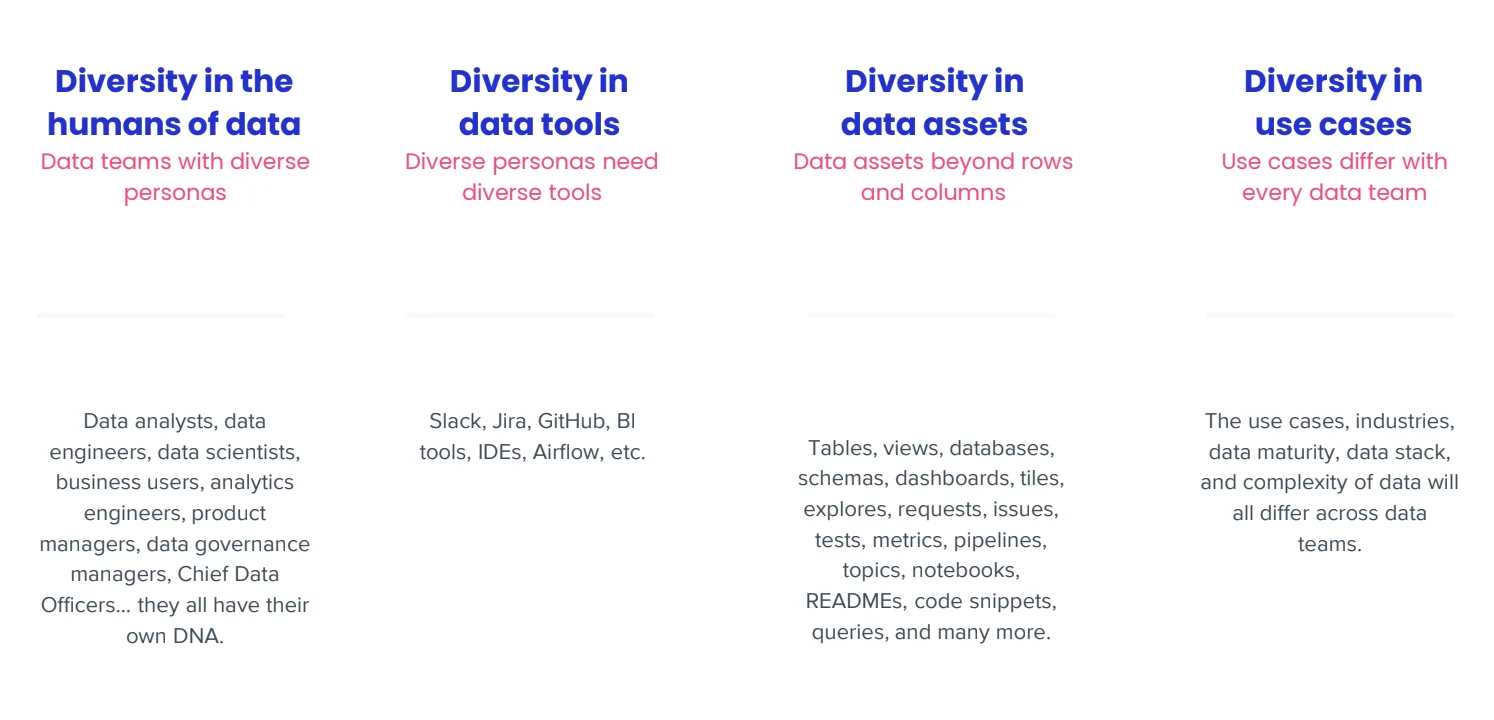
Diversity in data teams, tools, assets, and use cases requires a tool that can handle them to drive adoption. Image by Atlan.
Collibra’s UI/UX is outdated and non-intuitive, often failing to achieve enterprise-wide adoption, particularly among business users.
As a result, we frequently see customers switching to Atlan after 12-18 months of failed implementations. End users overwhelmingly prefer Atlan’s adoption-first, personalized browsing experience—leading to 90%+ adoption within 90 days.
“Implementing a data catalog is about adoption. After taking a look at the best catalogs on the market, I chose Atlan, and I would choose Atlan again if I had to. It’s the best UX, best experience, and best adoption.” - Otávio Leite Bastos, Global Governance Lead, Contentsquare
2. Get context where you work
Permalink to “2. Get context where you work”Atlan is the only platform in the market that’s taking the active metadata approach to solving for cataloging, governance, and other use cases.
Active metadata ensures that there’s a bi-directional flow of metadata from Atlan to your preferred data tools and vice-versa.
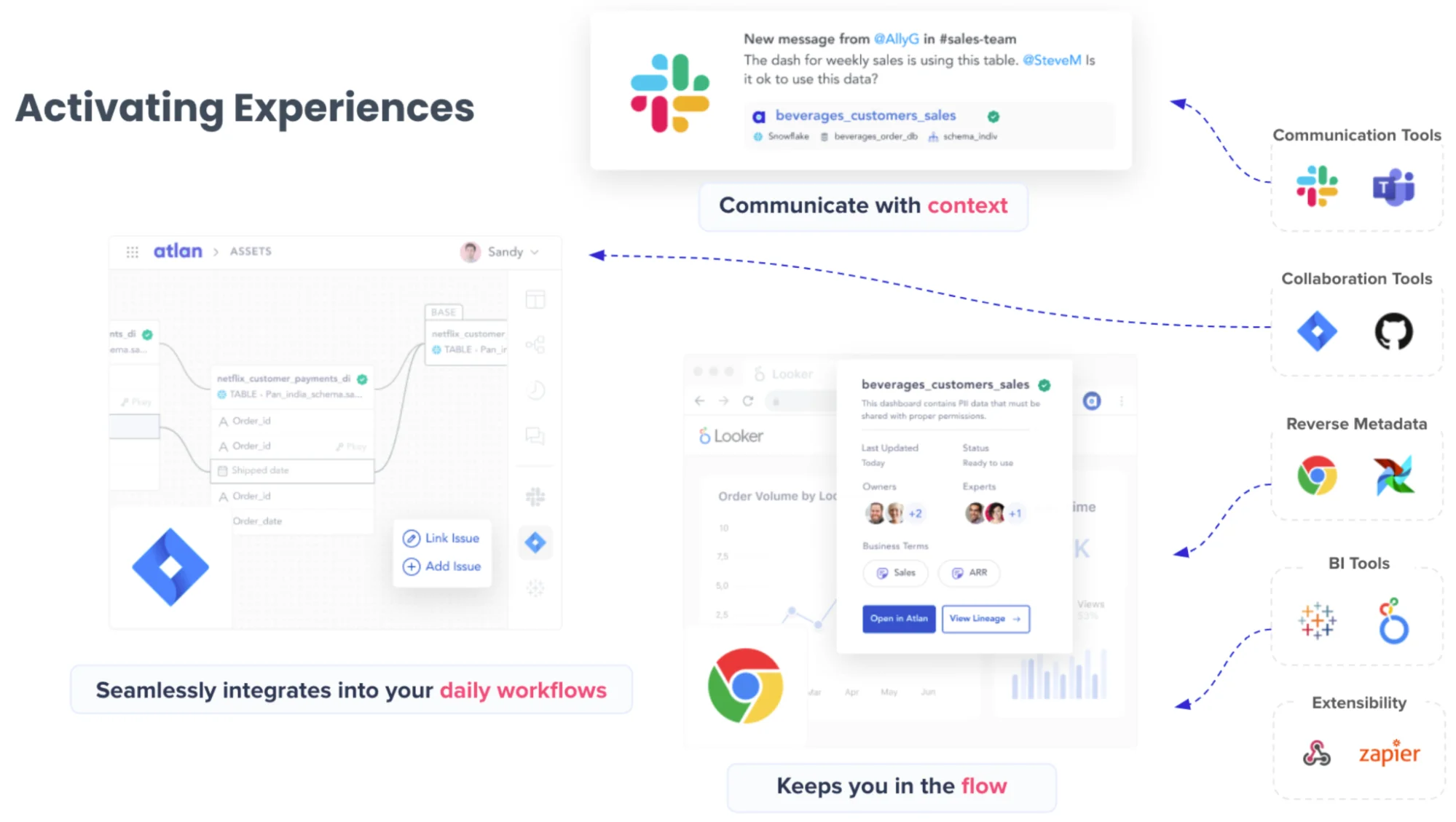
Visual representation of how Atlan activates metadata to keep you in the flow. Source: Atlan.
For example, using Atlan’s Google Sheets Extension, you can import lineage from Atlan into Google Sheets, and even update columns in the sheets – which you can sync back to Atlan for the consumption of other folks.
Similarly, you can be in a BI tool like Tableau and encounter a number in a dashboard that doesn’t look right. Using Atlan’s Chrome extension, you can see a sidebar with all context on a data asset pop up in the same tab for you to understand and act on it.
3. Data product marketplace that supports federated governance
Permalink to “3. Data product marketplace that supports federated governance”Legacy platforms like Collibra are catalog-centric, with limited federation.
Atlan comes with a dedicated data product marketplace that supports federated business domain experience with native data products, domains, and contracts.
You can package data tables, dashboards, metrics, and essential business context into trusted, reusable data products, organized by domain and enriched with documentation.
“It’s important that we offer reliable and discoverable data. Atlan’s flexibility gave us an umbrella over all our metadata and helped evaluate how well our data products perform against specific criteria, ensuring they meet required standards.” - Martina Ivanicova, Data Engineering Manager at Kiwi
4. Automated, column-level lineage across your data and AI ecosystem
Permalink to “4. Automated, column-level lineage across your data and AI ecosystem”Collibra and other legacy competitors create a clunky lineage experience that is hard to generate and interpret. The setup is complex and the tracking is unreliable.
With Atlan, you get automated, column-level visibility of your data and AI estate. This enables you to perform trustworthy impact analysis across both modern and legacy tools.
What sets Atlan apart is that its lineage also drives action. It has built-in line actions that allow you to raise tickets in JIRA, collaborate on Slack, and do much more without switching between apps.
“Using Atlan’s automated lineage, we started analyzing [data assets in] Snowflake and Fivetran. They could see every existing connection, what was actually used. We kept those, and for everything else, we would disconnect.” - Data Team, Mistertemp, after their lineage-driven optimization to deprecate two-thirds of their data assets
5. Metadata intelligence and automation
Permalink to “5. Metadata intelligence and automation”Platforms like Collibra are stewardship-heavy, and rely on manual processes for several governance workflows.
From automated alerts to magical metadata suggestions, Atlan’s AI-powered enrichment and rule-based workflows scale stewardship across even the largest estates.
You can auto-classify sensitive data, auto-assign data owners, certify tables, send alerts about critical issues in your pipelines, and more.
“We are big believers in automating wherever possible and the quality and depth of your APIs, the fact that everything can be API-driven, was a huge deal for us.” - Phil Warner, Director of Data at Boulevard
6. DIY, no-code connectors help you go live in weeks, not months
Permalink to “6. DIY, no-code connectors help you go live in weeks, not months”Legacy platforms like Collibra can take over a year just to set up. And that’s just for the initial setup - getting the software connected to your entire data estate and generating value is a whole different ball game.
Atlan setup is with DIY connectors and takes weeks, instead of waiting months or years.
This is evidenced by G2 reviews rating Atlan significantly above Collibra on ease of setup, ease of use, and ease of admin.
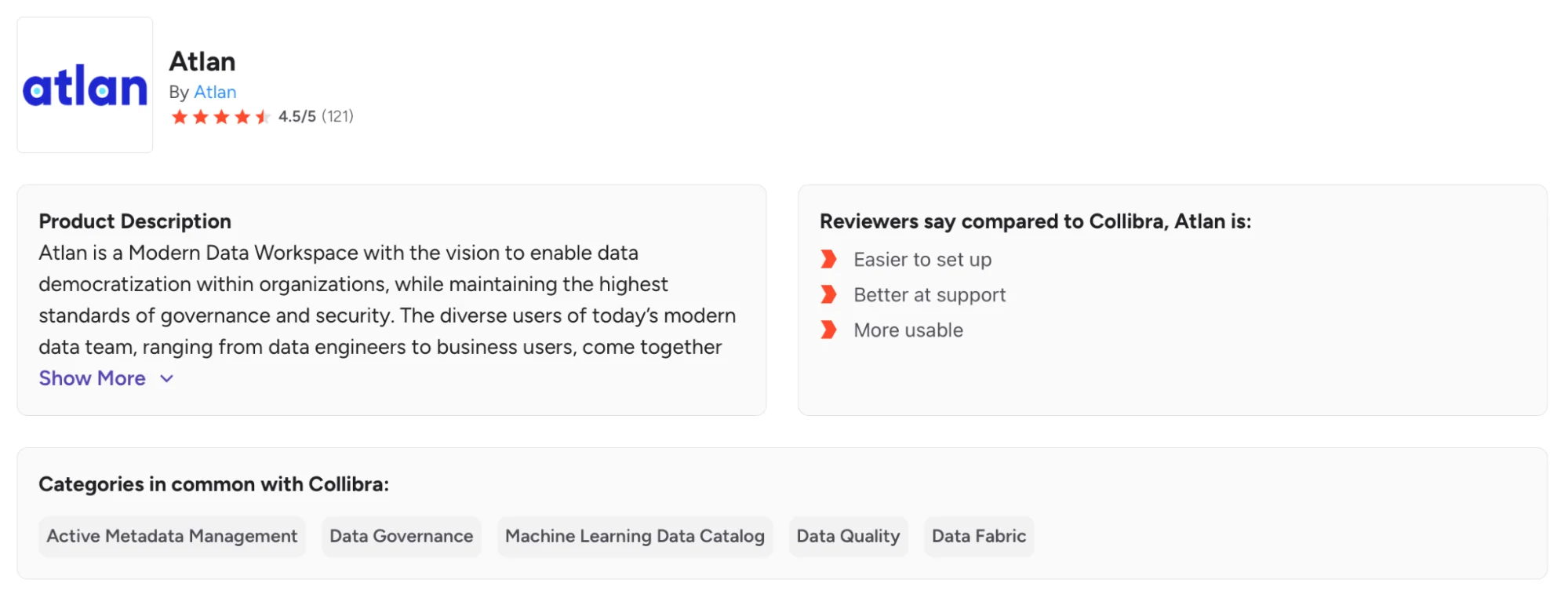
Atlan is of the top Collibra alternatives recently reviewed by the G2 community. Source: G2.
“We chose Atlan because they integrate with our modern analytics stack such as Snowflake and Tableau. It was very easy to set up — we had all our data sources flowing in within the first day!” - Danielle Boeglin VP of Data & Analytics, TechStyle
7. Cloud-native, interoperable with the world’s first Iceberg-native metadata lakehouse
Permalink to “7. Cloud-native, interoperable with the world’s first Iceberg-native metadata lakehouse”Atlan offers the first Iceberg-native metadata lakehouse, designed for scale and interoperability. This is vital to unify context across data sources, systems, apps, and AI models.
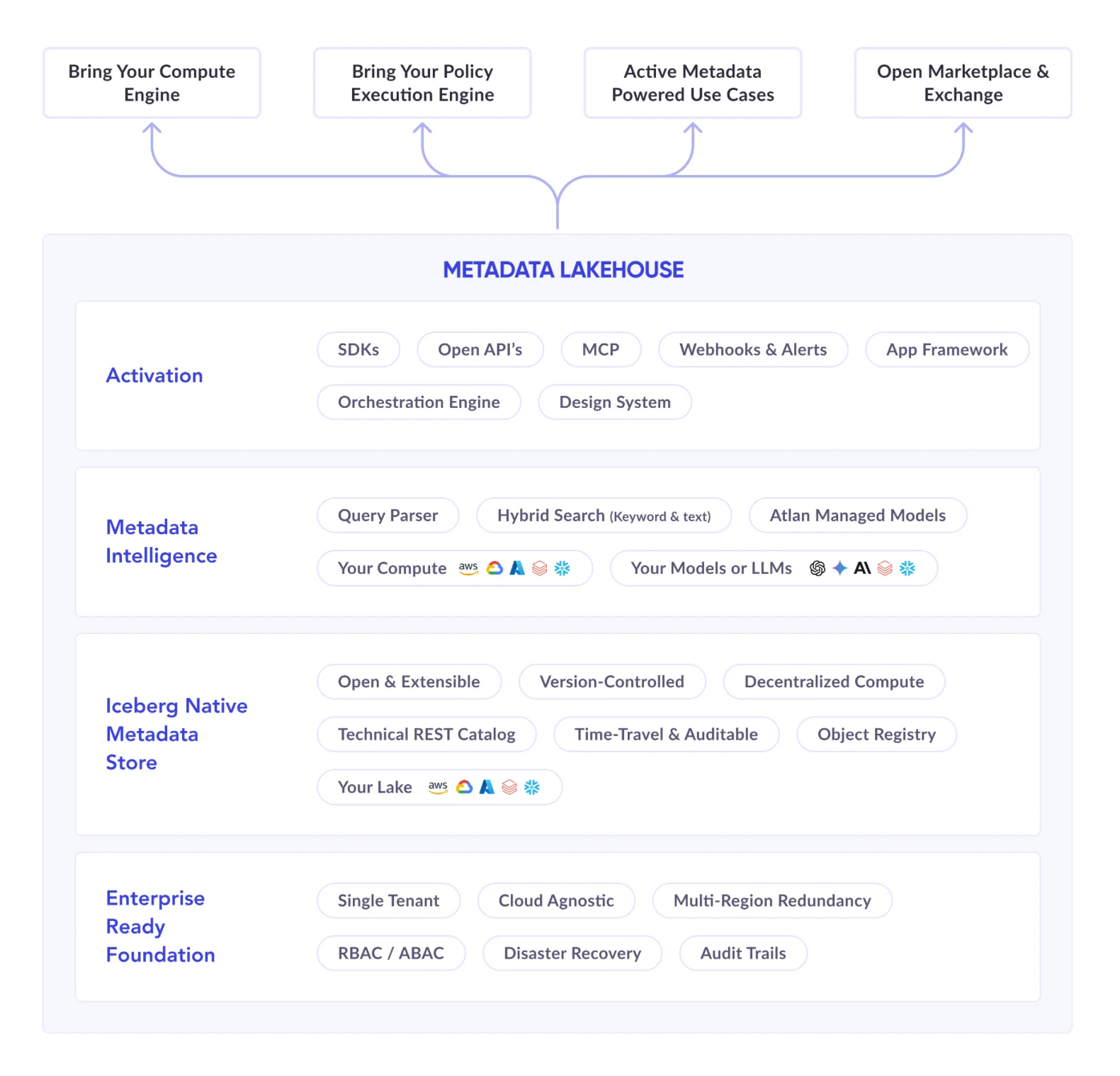
How Atlan’s open metadata lakehouse future-proofs and activates your data estate. Image by Atlan.
Moreover, unlike Collibra’s legacy setup, Atlan’s open architecture delivers bidirectional metadata sync with modern, cloud-native data tools like Snowflake, Databricks, Looker, Tableau, Power BI, Airflow, dbt, etc.
“Atlan is built on an Open API architecture. That clearly allows us to have extensibility across all of our data stacks. That was a key gamechanger for us.” - Mihir Modi, Data Governance Manager at Fox
8. Extensible by design built for the AI era
Permalink to “8. Extensible by design built for the AI era”Legacy tools like Collibra merely document data and have limited AI capabilities, with no MCP support.
Atlan offers endless extensibility with numerous connectors and open APIs.
More recently, Atlan’s extensible app framework empowers you to build AI-native apps on Atlan, and Atlan MCP (Model Context Protocol) gives your AI agents the context they’re missing with real-time metadata.
9. Active data and AI governance
Permalink to “9. Active data and AI governance”With Atlan, the best AI governance platform, you get automated policy enforcement, tag propagation across lineage paths, and stewardship workflows that your teams can actually operate and customize.
Moreover, Atlan’s AI governance drives your AI initiatives forward while ensuring trust and transparency with centralized AI asset management and data flow mapping across the AI lifecycle, and more.
That’s why modern enterprises like Mastercard, North, General Motors, Tide, Doc Martens, Unilever, Yape, and Autodesk choose Atlan as their data + AI control plane.
Real stories, real customers: Why modern enterprises chose Atlan for cataloging and governance
Permalink to “Real stories, real customers: Why modern enterprises chose Atlan for cataloging and governance”
Why Yape chose Atlan to govern Databricks and democratize access
“Collibra didn’t meet our expectations because by early 2023, their integration with Databricks Unity Catalog wasn’t the best. But more than Databricks, we needed a platform for innovation to stay ahead of our competitors. That’s what I really liked about Atlan. You’re constantly innovating with the latest trends, you have Atlan AI, you support Data Mesh natively. [And] you have the best UI in the market right now.”
Jorge Plasencia, Data Catalog & Data Observability Platform Lead
Yape
🎧 Listen to podcast: Why Yape chose Atlan to govern Databricks and democratize access

Why CouponFollow chose Atlan as the glue between data producers and consumers
“I did some shopping around to look at the other options, like Alation, Castor, and Collibra. The differentiating factor with Atlan is its position in the market. It’s this “sweet spot” where I think Atlan can work with any company. The product is well built-out, and any features I would like to have seen in my wishlist were already there. There wasn’t anything lacking.”
Ted Andersson, Director of Business Intelligence
CouponFollow
🎧 Listen to podcast: Why CouponFollow chose Atlan as the glue between data producers and consumers

Why General Motors chose Atlan for enterprise-scale governance
“We also chose Atlan because of the shift-left philosophy. We’ve come with some out-of-the-box thinking. Your team has always said, “We can do that. Tell us about what you want to accomplish, and we’ll make that work.”
Sherri Adame, Data Governance Lead
General Motors
Ready to choose the best Collibra alternative for your enterprise?
Permalink to “Ready to choose the best Collibra alternative for your enterprise?”Picking a data catalog tool and governance platform that acts as your metadata, control, and context plane is arguably one of the most important investments that you can make as a data leader.
But, it doesn’t help when solutions come with prohibitive licensing fees upfront, especially solutions that aren’t ideal for enterprise-wide adoption. Customers of many legacy tools, including Collibra, face this exact challenge.
Atlan offers the strongest path forward–an experience similar to that of other modern tools you enjoy. Once set up, you can start experiencing its value within weeks. As you become more familiar with the tool, you can add more domains and users.
FAQs about best Collibra alternatives
Permalink to “FAQs about best Collibra alternatives”1. Who competes with Collibra?
Permalink to “1. Who competes with Collibra?”Atlan is widely regarded as the biggest Collibra competitor due to its high scores in industry reports, adoption-first design, endless extensibility, and metadata intelligence and automation.
Unlike Collibra, Atlan ensures quicker setup, superior UX for diverse teams, more powerful automation capabilities, and AI governance.
2. What is the difference between Collibra and Atlan?
Permalink to “2. What is the difference between Collibra and Atlan?”Collibra is a traditional governance workflow platform—strong in policy modeling, stewardship workflows, and regulatory documentation, but often dependent on manual configuration and long implementation cycles. Its AI governance and automation capabilities are also limited.
Atlan, by contrast, is an active metadata control plane that embeds context directly into BI tools, notebooks, and developer workflows, enabling faster ROI, broader adoption, and AI-ready use cases.
3. What are the open-source alternatives to Collibra?
Permalink to “3. What are the open-source alternatives to Collibra?”Popular open-source alternatives to Collibra include Amundsen, DataHub, Apache Atlas, Metacat, and OpenMetadata. These tools offer varying features and integrations depending on your data cataloging needs.
Many teams consider these when looking for more flexible or cost-effective solutions.
4. Is Atlan a good alternative for Collibra?
Permalink to “4. Is Atlan a good alternative for Collibra?”Yes. Teams switching from Collibra to Atlan typically cite faster deployment (weeks vs. months), deeper automated lineage, better AI-readiness, and much higher adoption (90%+ across business + technical users).
Atlan’s active metadata foundation and embedded collaboration reduce manual stewardship, whereas Atlan’s AI governance, MCP support, and app framework ensure you’re well-equipped for the AI era.
5. Is Atlan easier to set up than Collibra?
Permalink to “5. Is Atlan easier to set up than Collibra?”Yes. Collibra typically requires months of configuration, custom modeling, and extensive professional services.
Atlan is designed for self-service deployment, native connectors, and an intuitive UX—helping teams onboard in weeks, not months. Many enterprises report first-value wins within 6–8 weeks after switching.
6. How does Atlan’s active metadata differ from Collibra?
Permalink to “6. How does Atlan’s active metadata differ from Collibra?”Atlan uses active metadata to automate lineage extraction, quality insights, policy propagation, and contextual enrichment. This intelligence is pushed directly into tools like Snowflake, Databricks, dbt, Looker, and Slack to guide decisions in real time.
Collibra centralizes metadata but relies more heavily on manual effort and stewardship-heavy workflows, making it harder to scale in fast-changing modern stacks.
7. What should I consider before migrating from Collibra to another platform?
Permalink to “7. What should I consider before migrating from Collibra to another platform?”Key considerations include:
- Automation depth (lineage, classification, policy sync)
- Connector breadth and extensibility
- AI governance readiness (model registry, provenance, explainability)
- Time to value (weeks vs. months or years)
- Adoption across personas (business + technical)
- Total cost of ownership (professional services, infrastructure, upgrades
A proof of concept (POC) comparing lineage accuracy, search quality, and UX often clarifies the best fit.
8. Which Collibra competitors work best for AI and LLM governance?
Permalink to “8. Which Collibra competitors work best for AI and LLM governance?”A platform like Atlan is best positioned for AI governance, as it offers AI asset registry, model lineage, versioning, metadata enrichment, and policy activation through active metadata.
Share this article
Atlan is the next-generation platform for data and AI governance. It is a control plane that stitches together a business's disparate data infrastructure, cataloging and enriching data with business context and security.
Collibra alternatives: Related reads
Permalink to “Collibra alternatives: Related reads”- What Is a Data Catalog? & Do You Need One?
- 12 Best Data Catalog Tools in 2026 | A Complete Roundup of Key Capabilities
- Best Alation Alternative: 5 Reasons Why Customers Choose Atlan
- Data Catalog Examples | Use Cases Across Industries and Implementation Guide
- What Is a Metadata Catalog? - Basics & Use Cases
- 7 Top AI Governance Tools Compared | A Complete Roundup for 2026
- Modern Data Catalog: What They Are, How They’ve Changed, Where They’re Going
- Open Source Data Catalog - List of 6 Popular Tools to Consider in 2026
- 5 Main Benefits of Data Catalog & Why Do You Need It?
- Enterprise Data Catalogs: Attributes, Capabilities, Use Cases & Business Value
- The Top 11 Data Catalog Use Cases with Examples
- 5 Best Data Governance Platforms in 2026 | A Complete Evaluation Guide to Help You Choose
- Data Lineage Tracking | Why It Matters, How It Works & Best Practices for 2026
- Snowflake Data Catalog: Importance, Benefits, Native Capabilities & Evaluation Guide
- Data Catalog vs. Data Lineage: Differences, Use Cases, and Evolution of Available Solutions
- 9 Best Data Lineage Tools: Critical Features, Use Cases & Innovations
- Data Lineage Solutions: Capabilities and 2026 Guidance
- AI Data Catalog: Exploring the Possibilities That Artificial Intelligence Brings to Your Metadata Applications & Data Interactions
- Machine Learning Data Catalog: Evolution, Benefits, Business Impacts and Use Cases in 2026
- 7 Data Catalog Capabilities That Can Unlock Business Value for Modern Enterprises
- Data Catalog Architecture: Insights into Key Components, Integrations, and Open Source Examples
- Build vs. Buy Data Catalog: What Should Factor Into Your Decision Making?
- Data Catalog Pricing: Understanding What You’re Paying For
- Data Catalog Comparison: 6 Fundamental Factors to Consider
- Alation Data Catalog: Is it Right for Your Modern Business Needs?
- Collibra Data Catalog: Is It a Viable Option for Businesses Navigating the Evolving Data Landscape?
- Informatica Data Catalog Pricing: Estimate the Total Cost of Ownership
- Informatica Data Catalog Alternatives? 6 Reasons Why Top Data Teams Prefer Atlan
- Data Catalog Implementation Plan: 10 Steps to Follow, Common Roadblocks & Solutions
- Data Catalog Demo 101: What to Expect, Questions to Ask, and More
- Data Mesh Catalog: Manage Federated Domains, Curate Data Products, and Unlock Your Data Mesh
- Best Data Catalog: How to Find a Tool That Grows With Your Business
- The Forrester Wave™: Enterprise Data Catalogs, Q3 2024 | Available Now
- How to Pick the Best Enterprise Data Catalog? Experts Recommend These 11 Key Criteria for Your Evaluation Checklist
- Collibra Pricing: Will It Deliver a Return on Investment?
- OpenMetadata vs. DataHub: Compare Architecture, Capabilities, Integrations & More
- Automated Data Catalog: What Is It and How Does It Simplify Metadata Management, Data Lineage, Governance, and More
- Data Governance in Action: Community-Centered and Personalized
- Data Governance Tools: Importance, Key Capabilities, Trends, and Deployment Options
- Data Governance Tools Cost: What’s The Actual Price?
- Data Governance Process in 8 Steps: Why Your Business Can’t Succeed Without It
- Data Governance for AI: Challenges & Best Practices



















